Reflections by Summer 2023 Interns
Saskia den Boon (EN & CFA): Beacon Press
 “Working at Beacon, I felt incredibly motivated and invigorated by this community of people who shared my values of equality and freedom. My co-workers challenged me to think critically and discuss the most fundamental issues of today: race, gender, sexuality, environment, education, relearning, and more.” At Beacon Press, Saskia applied her writing skills to her work in the editorial and marketing departments. Read more about Saskia’s internship experience here.
“Working at Beacon, I felt incredibly motivated and invigorated by this community of people who shared my values of equality and freedom. My co-workers challenged me to think critically and discuss the most fundamental issues of today: race, gender, sexuality, environment, education, relearning, and more.” At Beacon Press, Saskia applied her writing skills to her work in the editorial and marketing departments. Read more about Saskia’s internship experience here.
Alexandra Mascarello (PH): Brattle Film Foundation
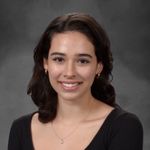 “Through my internship, I broadened the knowledge and skills I gained from my humanities education. I became a stronger writer and researcher, and I deepened my love for film and the arts even more. I also gained non-profit work experience, which is helpful for my future career.” At the Brattle Film Foundation, Alexandra spent her summer grant writing and creating a movie program related to her philosophy major. Read more about Alexandra’s internship experience here.
“Through my internship, I broadened the knowledge and skills I gained from my humanities education. I became a stronger writer and researcher, and I deepened my love for film and the arts even more. I also gained non-profit work experience, which is helpful for my future career.” At the Brattle Film Foundation, Alexandra spent her summer grant writing and creating a movie program related to her philosophy major. Read more about Alexandra’s internship experience here.
Emma Sophia Obregon Dominguez (HI): Boston Globe
 “I walked into the Globe’s office with little knowledge about the field and walked out three months later with skills that will help me for the rest of my life.” At The Boston Globe, Emma wrote stories for the Metro and Health sections. Read more about Emma’s internship experience here.
“I walked into the Globe’s office with little knowledge about the field and walked out three months later with skills that will help me for the rest of my life.” At The Boston Globe, Emma wrote stories for the Metro and Health sections. Read more about Emma’s internship experience here.
Emma Grier Shearburn (HAA): BU School of Public Health Office of Communications
 “With the help of Mike Saunders, I was able to change my writing style from an academic voice to a journalistic one. My writing skills are forever changed because of the Marketing and Communications team.” At SPH, Emma wrote stories relevant to the BU community, including one on a topic of her choosing. Read more about Emma’s internship experience here.
“With the help of Mike Saunders, I was able to change my writing style from an academic voice to a journalistic one. My writing skills are forever changed because of the Marketing and Communications team.” At SPH, Emma wrote stories relevant to the BU community, including one on a topic of her choosing. Read more about Emma’s internship experience here.
Reflections by Summer 2022 Interns
In summer 2022, undergraduates held internships at continuing partner institutions, the Brattle Theatre, Beacon Press, BU School of Public Health Office of Communications, The Boston Globe, and Burns & Levinson LLP.
Charlotte Greenhill (LAS): School of Public Health
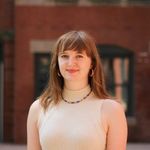 “I appreciated the opportunity to get involved with the school behind the scenes and connect with faculty and staff across departments. I learned almost as much from doorway conversations and sitting in on meetings as I did from writing articles.” Read more about Charlotte’s internship experience here.
“I appreciated the opportunity to get involved with the school behind the scenes and connect with faculty and staff across departments. I learned almost as much from doorway conversations and sitting in on meetings as I did from writing articles.” Read more about Charlotte’s internship experience here.
Rebecca Kielar (HAA): Burns & Levinson LLP
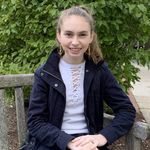 “My internship at Burns & Levinson has provided me with a concrete understanding of what working in a law firm entails. From participating in the program, I am now confident that a legal career is the path I should pursue.” Read more about Rebecca’s internship experience here.
“My internship at Burns & Levinson has provided me with a concrete understanding of what working in a law firm entails. From participating in the program, I am now confident that a legal career is the path I should pursue.” Read more about Rebecca’s internship experience here.
Kathryn Lakin (EN): Beacon Press
 “My internship at Beacon was such a valuable chance for me to learn not only about publishing at Beacon specifically but about the industry as a whole and the uniqueness of the book market.” Read more about Kathryn’s internship experience here.
“My internship at Beacon was such a valuable chance for me to learn not only about publishing at Beacon specifically but about the industry as a whole and the uniqueness of the book market.” Read more about Kathryn’s internship experience here.
Danielle Momoh (CIMS): The Boston Globe
 “At the Boston Globe, I was not tasked with busywork. Instead, I was encouraged to pitch my own ideas for articles and speak out if I thought there were any improvements to be made to the Living/Arts section.” Read more about Danielle’s internship experience here.
“At the Boston Globe, I was not tasked with busywork. Instead, I was encouraged to pitch my own ideas for articles and speak out if I thought there were any improvements to be made to the Living/Arts section.” Read more about Danielle’s internship experience here.
Simone Seiner (HI): Brattle Film Foundation
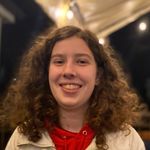 “Finishing the project felt like such an accomplishment. I felt accomplished knowing that it wasn’t busywork but rather work that was going to have a clear usage in the future running of the theater, even once I was gone.” Read more about Simone’s internship experience here.
“Finishing the project felt like such an accomplishment. I felt accomplished knowing that it wasn’t busywork but rather work that was going to have a clear usage in the future running of the theater, even once I was gone.” Read more about Simone’s internship experience here.
Reflections by Summer 2021 Interns
Julia Bulafka (EN): Beacon Press
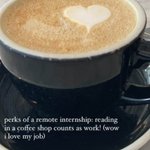 “. . . I [got] a full picture of the many different roles and responsibilities that editors take on. . . [and] a completely different perspective of the work that goes into bringing a book to the shelves. . .I felt valued as a team member here, and I gained more knowledge and experience than I knew was possible in just eight weeks.” Read more about Julia’s internship experience here.
“. . . I [got] a full picture of the many different roles and responsibilities that editors take on. . . [and] a completely different perspective of the work that goes into bringing a book to the shelves. . .I felt valued as a team member here, and I gained more knowledge and experience than I knew was possible in just eight weeks.” Read more about Julia’s internship experience here.
Catherine Devlin (HI): Burns & Levinson LLP
 “Interning as a paralegal in a mid-size law firm put me in the right place to ask questions not only about being a paralegal but about multiple different legal paths. In doing so, I learned about the significance of the humanities in preparing students for careers that require understanding and expressing complex information in multiple formats.” Read more about Catherine’s internship experience here.
“Interning as a paralegal in a mid-size law firm put me in the right place to ask questions not only about being a paralegal but about multiple different legal paths. In doing so, I learned about the significance of the humanities in preparing students for careers that require understanding and expressing complex information in multiple formats.” Read more about Catherine’s internship experience here.
Kelsey Lu (PH & PO): The Boston Globe
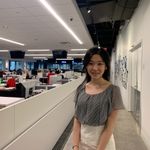 “The Boston Globe is a wonderful place for interns. . . . Everyone was friendly, insightful, and passionate. It was always fascinating to come to the office and talk to the staff about published stories. . . . I truly learned so much.” Read more about Kelsey’s internship experience here.
“The Boston Globe is a wonderful place for interns. . . . Everyone was friendly, insightful, and passionate. It was always fascinating to come to the office and talk to the staff about published stories. . . . I truly learned so much.” Read more about Kelsey’s internship experience here.
Lukas Ruschak (HI): Brattle Theatre
“My internship at the Brattle Theater was . . . a rewarding experience that taught me a lot about working at nonprofits and cultural institutions. I am proud of the projects that I worked on.” Read more about Lukas’s internship experience here.
David Winner (PH & WLL): BU School of Public Health
“There are so many good things to say about the SPH internship. I won’t write a laundry list, but I’ll sum up the details: the work was refreshingly real, it was challenging, it was fascinating, it was invigorating. I got paid to interview exciting people and write about emerging public health scholarship. There’s not much more I can ask of a summer.” Read more about David’s internship experience here.
Reflections by Summer 2020 Undergraduate Interns
Anna Driscoll (EN): Brattle Theatre
This summer, I had the opportunity to intern with The Brattle Theater, an independent cinema in Cambridge, MA. Unfortunately, between the time when I applied for the internship and when it actually began, the Brattle and independent art houses nationwide were forced to close due to the coronavirus pandemic. My internship was luckily able to be pivoted to a remote setting, and, while the circumstances surrounding it were out of the ordinary, I gained valuable insight and experienced what working in arts administration is like. Over the summer, I worked primarily with Ivy Moylan, the Brattle’s executive director, and was able to see firsthand what kind of work running an arts not-for-profit entails. I also sat in on some of the Brattle’s daily staff meetings and spoke one-on-one with members of the staff to better understand the specifics of their particular positions, and to learn about their experiences working in arts administration. Finally, while my experience working with the Brattle was different from what it was planned to be, there are some ways in which the extenuating circumstances that altered it so entirely actually allowed me to engage with certain aspects of working for an independent art house that I otherwise would not have been able to. In sum, through my internship with the Brattle, I was able to be trained on some of the work that working in arts administration entails, be exposed to the work culture that is cultivated there, better understand the community aspect of working for an independent arts organization, and learn about the importance of adaptability in this field under truly tumultuous and irregular circumstances.
Ivy and I met regularly over Zoom to check in, for her to train me on assignments, and so that I could update her on my progress and ask any questions that arose. I came to really respect her management style at the Brattle, and I truly appreciated her availability, her investment in making my internship valuable, and the interest she took in my own thoughts and wishes this summer. With her guidance, I learned how to research and take notes on patrons that donated to the Brattle, which will be used to guide the Brattle’s future correspondences with them, and aid with building relationships with donors. This involved working on a large spreadsheet with names of people that donated to the Brattle in 2020, and using resources like PatronManager, WealthEngine, Google, LinkedIn, and Facebook to try and gather information and understand the donors’ relationships with the Brattle. Another task I was trained on was fundraising research. This involved taking notes on a spreadsheet of notable people that work in the film and television industry (such as John Krasinski, David Lynch, Darren Aronofsky, and others) that have relationships with the Brattle, and researching them using IMDbPro, their social media, and Google searches. In working on these two projects, I learned about the utmost importance of community and fostering relationships with donors when running an arts not-for-profit, as well as how to research and to prioritize certain prospective donors. I also came to understand the importance of networking, and the place of small independent theaters like the Brattle, not just in their own communities, but within the film industry as a whole.
Another task I worked on with Ivy and Ned Hinkle, the Brattle’s creative director, was writing film descriptions. This involved writing short descriptions about films that the Brattle screens, to be put on their website or calendar. The descriptions are intended to tell the reader notable information about the film, such as what film wave it was a part of, or its significance within film history, tell them a little bit about the plot without giving it away, and feature the film’s selling points, such as if it has especially great cinematography or a notable performance in it, but also be honest if a film might not be for everyone. The result was usually a short paragraph that was a cross between a film synopsis, a review, a puff piece, and a way to connect with the person reading. For instance, for Hitchcock’s Rear Window, I wrote:
A premise that is perhaps unfortunately familiar to us in the midst of a pandemic, Hitchcock’s Rear Window stars Jimmy Stewart as L.B. “Jeff” Jeffries, a photographer with a broken leg who is bound not only to a wheelchair, but to one apartment, left to observe the world through a window. Along with his beautiful socialite girlfriend, played by Grace Kelly, he spies on his neighbors after becoming convinced that one of them has killed his wife. The film never ventures beyond Jeff’s apartment. We become as trapped as he is — inside his point of view, inside his lack of freedom, and inside his limited perspective. We come to share his obsession with voyeuristically watching the private lives of his neighbors through a window. After all, why else do we go to the movies if not to be transported by watching the lives of others through a lens? And when could that be needed more than in times like these?
Writing these descriptions exposed me to the marketing side of arts administration, as I learned a new way to write about films, which aims to showcase them a certain way, with the Brattle’s cinema-literate audience in mind.
I was also sure to take advantage of opportunities to engage with the rest of the Brattle staff as much as possible, outside of my one-one-one meetings with Ivy. While under normal circumstances, I would have met the rest of the staff and been exposed to the work culture through going to the theater in person regularly, this wasn’t possible with everyone working remotely. Instead, I was able to sit in on a couple of their daily staff meetings, and meet one-on-one with the Brattle’s office manager, development assistant, and marketing manager to ask questions about their jobs, personal experiences at the Brattle, and knowledge about the arts administration field as a whole. One of the things I came to learn and appreciate through these experiences was how open and transparent the communications between staff is at the theater. During the daily staff meetings, Ivy and Ned would update everyone on their progress on fundraising and plans to reopen, and each staff member would go around and update everyone on their own work. While meeting with staff members personally, one thing that came up continuously was that everyone really valued the open and supportive work environment fostered at the Brattle. While there is certainly structure to the Brattle’s team in that there are clear distinctions between jobs and the roles of each staff member, it seems as though there is not as much of a power hierarchy as there may be in some fields. It seems that everyone working there cares very much about the theater and feels as though they are working with a similarly-minded team of people. It became clear to me that every staff member believes in the Brattle and the importance of their work, and feels united with their coworkers in that everyone is working towards a similar goal. As Rachel Lanza, the Brattle’s office manager told me, “It’s very grass-roots, it feels kind of badass.”
In some ways, I am grateful for the virtual format of my internship, as it allowed for certain and experiences that might not have been available if the internship had proceeded as planned. For instance, I do not think I would have otherwise met one-on-one with members of the staff, and been able to have such in depth conversations or asked them the kinds of questions that I did. Similarly, Ivy told me that their daily staff Zoom meetings only began as a way for everyone to stay connected during quarantine, and that though they are not normally necessary, she feels that everyone is a little more informed and up to date because of them. Additionally, I was asked to sit in and take notes on a couple of Art House Convergence meetings about reopening theaters post COVID-19. The Art House Convergence is an association of museums, theaters, film societies, and micro cinemas nationwide that has been hosting weekly hour-long seminars over Zoom for independent art houses to stay connected and share information in the midst of the COVID-19 pandemic. The AHC meetings covered information ranging from how to decide whether or not your theater is ready to reopen, to how to phrase reopening communications with patrons, to guidelines and regulations that should be followed upon reopening. Taking notes on these meetings helped me to see a part of and understand how the Brattle fits into a larger community of independent theaters. It also made me understand just how much responsibility and how many decisions go into running a small arts not-for-profit, especially during such tenuous and unforeseen circumstances. For example, the meetings brought up questions as large as how to decide if your theater is ready to open based on your community’s COVID-19 infection rates, to as small and specific as the safest way to serve popcorn and other concessions to your guests. It was clear to me that the Brattle and all the other small theaters attending the AHC meetings take the responsibility of reopening quite seriously, as every decision was discussed in light of how it might affect their finances, staff, audiences, and larger communities. In fact, during the course of my internship, Film Scene, an independent theater in Iowa City that attended the AHC meetings, went through the process of reopening, only to decide to close again in light of the COVID numbers in their community worsening. The Art House Convergence meetings were invaluable for me in that they allowed me to feel connected with the larger arts administration community as well as see how small art houses must adapt in such tumultuous times and come to understand that in many ways, running them can be a struggle for survival.
Though it is difficult to know exactly how my internship would have differed if it had proceeded as planned, let alone the extent to which my experience may or may not have been compromised, I found the experience extremely rewarding and believe that there are some ways in which it was made even more so by the extenuating circumstances. In fact, Ivy even told me that the Brattle being closed and in such an uncertain state opened the door for me to do more directed and even hands-on work than I normally would have, like writing film descriptions and taking notes on the AHC meetings. Similarly, she told me that their daily staff meetings came about as a result of having to work remotely, they allow more communication and openness. Additionally, I greatly appreciated the availability and willingness of the Brattle staff members to meet with me, as I believe that it allowed me to better grasp what working in arts administration is really like. In sum, I found my experience extremely valuable, and have taken a lot away from it.
Anna Driscoll, CAS, English ’21
Priyanka Ray (EN): Beacon Press
Priyanka’s internship in summer 2020 led to a full-time position in the Beacon Press publicity department starting in fall 2020.
This past summer I had the opportunity to intern at Beacon Press, an independent publisher of serious non-fiction that focuses on social issues. I was excited about the opportunity to intern at Beacon because of their emphasis on social justice and accessible scholarship. I knew Beacon was the perfect place to explore my passions for social and political issues and scholarship, and I am grateful that Beacon and BUCH provided me with the opportunity to complete a virtual rotational internship at Beacon in the editorial, marketing, and publicity departments.
My rotational internship at Beacon Press began in the editorial department, where I mainly read proposals in the areas of religion and science and wrote reader’s reports. I also attended weekly editorial meetings, where editors would discuss whether or not to move forward in the publishing process with certain proposals. It was fascinating to hear about the marketing and sales aspect of things, and there were so many interesting proposals accepted that I cannot wait to read once they are in book form!
My internship also involved research. I conducted research to determine if Beacon should reissue the works of Indigenous author Paula Gunn Allen and brainstormed design ideas, and I researched potential people to write blurbs for the gift edition of Howard Thurman’s Jesus and the Disinherited. (I loved being able to work with a Howard Thurman book as I transitioned out of BU.) Completing these projects gave me some insight into the innumerable tasks that comprise editorial work. Before my internship at Beacon, I did not have a great idea of the day-to-day tasks editors do besides the obvious reading and editing, so I loved being able to complete projects that introduced me to the broad scope of editorial work. The editorial assistant who supervised me made sure to familiarize me with what the EA position entails, and I left the editorial department feeling prepared for further internships or entry-level positions in this field.
My first project in the marketing department was tracking Beacon’s social media posts across Twitter and Facebook by topic and type in order to determine what kinds of posts were getting the most engagement. This project allowed me to become very familiar with Beacon’s social media and taught me about the practical aspects of publishing. I also drafted online copy (book descriptions you see on bookselling sites) and created promotional images for two of Beacon’s books using Canva.
In the publicity department, I researched podcasts to contact for an upcoming book, practiced writing short and long pitches targeting different audiences, and developed questions for an author Q & A. The publicists who supervised me really took my interest in gender and sexuality studies into consideration, letting me spend my time in the department reading and working with two books in this area, Dr. Hilary Levey-Friedman’s Here She Is, about the surprising feminist history of beauty pageants, and journalist Angela Chen’s ACE, about asexuality. Beacon’s books tackle some of the most important social and political issues of our time, so it was easy to feel passionate about doing tasks that would ensure these books get the attention they deserve.
Here are some of my takeaways from the experience.
-
- Come in with an open mind. Before the internship started, I was convinced editorial would be my favorite department. I did really love my time there and was sad when I had to move to the next department, but I found out that my interests and skillset really align with the work Beacon’s publicity department does.
- Beacon really values their interns. In all three departments, my supervisors carved out time in their schedules to check-in with me, provide feedback, and answer all my questions about the publishing. Two editors even met with me after my internship ended to answer my burning questions about editorial work. I was also able to attend weekly departmental meetings and the all-staff meeting as well. I didn’t think interns got to speak at these kinds of meetings, but I was given the opportunity to give updates on my work/life at the all-staff meetings, and to voice my opinions on proposals I had written readers reports for at editorial meetings. Working virtually can definitely feel alienating, so having frequent check-ins and being an active part of weekly meetings definitely helped me feel like a valued member of the Beacon team.
Priyanka Ray, CAS, English ’20
Douglas Darrah (EN): BU School of Public Health
Doug was originally slated for an Undergraduate Internship in the Humanities at the Boston Globe, as a photojournalist. When the newspaper had to cancel its entire internship program in summer 2020 due to COVID-19, BU Center for the Humanities director Susan Mizruchi approached Sandro Galea, dean of the BU School of Public Health to find a suitable placement for Doug. As a result, Doug spent the summer working for the communications department at SPH. His reflections below on the internship are accompanied by samples of his photographic work this summer.
When I accepted this internship offer, I was taking in-person classes, socializing regularly with hundreds of strangers, and looking forward to working at the Boston Globe. None of that is possible now, but I do not think I am worse off because of it. Thanks to Susan Mizruchi, the Center’s director, and Michael Saunders, my supervisor at the School of Public Health, I got an internship that honed my skills and helped me grow as a person.
My first assignment was to take pictures of the protests that followed the killing of George Floyd. I went to three protests, one through Brookline, one through downtown Boston, and one that went from Roxbury to Government Center. Each of these protests was composed of thousands of people. In order to accurately represent that scale in one photograph, I had to get creative. I tried to create panoramas and videos, but neither fit the format that Michael wanted. I submitted a few photos that showed the crowd filling the streets, parks, and other large, open spaces.
The second protest involved a large law enforcement presence. Boston police officers, state troopers, out of town officers, and federal military police were all on hand. Several of them glared while I photographed them, but none challenged me. Though none of those photos were published for privacy reasons, taking them helped me understand the limits of what I could do as a photographer.
Staying safe while also capturing the moment proved difficult. Getting pictures of speakers would sometimes require me to stand in the middle of a large crowd of strangers, any one of whom could be carrying the virus. For the most part, I tried to stand on the outside of the protest or up on top of trash cans. This allowed me to stay safe and to capture the protests from unique angles. I did not get infected while at the protests.
The largest assignment that I did for the School of Public Health was an article that I wrote about efforts to criminalize gender affirming care for adolescents. I interviewed nine people for the story, including five doctors affiliated with BU, two people who had transitioned, an LGB activist, and a legislator who sponsored one bill. The story began as a relatively simple one about two BU researchers who were concerned about the mental health impacts of these bills. As I spoke to more people about it and researched it further, the story grew longer and more complex.
Gender affirming care can be life-saving. Transgender people have higher rates of mental illness relative to the general population and affirming their gender transition is one of the best ways to help them. Due to ethical constraints, much of the research backing those statements is not as high quality as some would like it to be. The long term effects of these new medical procedures are also not especially well understood. But, to quote one doctor, we know enough its benefits to say that “doing nothing is doing harm.”
Writing this article helped me develop a more nuanced understanding of what the “truth” is. Before, I thought that most of what journalists did was simple fact checking. But I spent very little time answering questions like “Did this researcher actually say “X” or were they intentionally misquoted?” Instead, I had to figure out what was smoke and mirrors and what was an actual fire. The proponents of these bills cited a wide range of facts and testimonials. While much of what they said was verifiably true, figuring out whether it was relevant or not was much more complicated.
The hardest issue to work through with that article was that of desistance and de-transitioning. Sponsors of these bills argued that the increasing availability of gender affirming care was leading to more “false positives,” or teenager who assert a transgender identity when they are younger, get medical procedures done to their body, and then come to regret that later. No studies have come to that conclusion, but there is some anecdotal evidence that it is happening. Research has shown that only 1-3% of those who transition regret it, but those studies are older and focus on adults. Other studies have shown that 60-90% of adolescents who say they are transgender will eventually desist, or revert back to their sex assigned at birth. Those studies, however, used outdated definitions and have serious methodological problems. None of desistance studies look at people who received gender affirming care, so they do not directly prove the sponsor’s point. I also kept in mind the overarching question of, “Can this be used to argue for criminalization?”
What I am trying to illustrate is that a fact can be true in a vacuum but “the truth,” to whatever extent it exists, is made up of narratives. Building one that is fair to everyone involved is a thankless, nearly impossible task. Oftentimes, all the facts add up to a messy picture that forces the journalist to make difficult decisions about what to platform and what to disregard. In the example above, I had to relay everything I said here in about half as many words while still being fair to everybody involved. This was one of the hardest pieces of writing that I have ever done, but working on it taught me a lot about how to ethically disseminate information.
I wrote a second piece about Strength at Home, a domestic violence prevention program that Casey Taft, a BU researcher, has been running on military bases for years. Combat veterans are taught to use violence to solve problems they encounter in the battlefield. When they take that mindset and pair it with the trauma that often accompanies deployments, it can be hard for them to resolve domestic disputes peacefully. Strength at Home helps them unlearn their training and has been proven to be an effective preventative measure. Emily Rothman, a researcher who specializes in domestic violence, has been piloting a similar program for college students.
Writing this article was much easier. The subjects did not have an ideological stake in what I wrote, so they were much less inclined to zero in on details of questionable relevance.
I also took some pictures that were used as banners in emails. For these, I began exploring Boston on a more regular basis. I found parks, reservoirs, shopping districts, and neighborhoods that I simply did not have time to visit while I was at BU. I have attached some of my favorite shots from these explorations.
In normal times, I would have gone into the office, attended events, and met many interesting coworkers and interview subjects. None of that happened this summer, but I did not miss it. I managed to sharpen my writing skills and learn a lot about the world that I live in in spite of these unusual times. I could not have done that without the support of the Center for Humanities, as well as support from the cosponsors: the Office of the Associate Provost for Undergraduate Affairs, the Office of the Dean of the College of Arts & Sciences, and the Anthony & Mary Vigna Summer Internship Fund.
We have also included a photo-gallery of work by Doug Darrah, whose work at SPH included documenting aspects of the ongoing protests as well as the COVID-19 cityscape in Boston. As Doug notes in his reflections, the protests proved challenging to photograph for many reasons.



Doug also took some pictures that were used as banners in emails. For these, he began exploring Boston on a more regular basis. Doug found parks, reservoirs, shopping districts, and neighborhoods that he had not had time to visit while he was at BU. Doug kindly share with us some of his favorite shots.

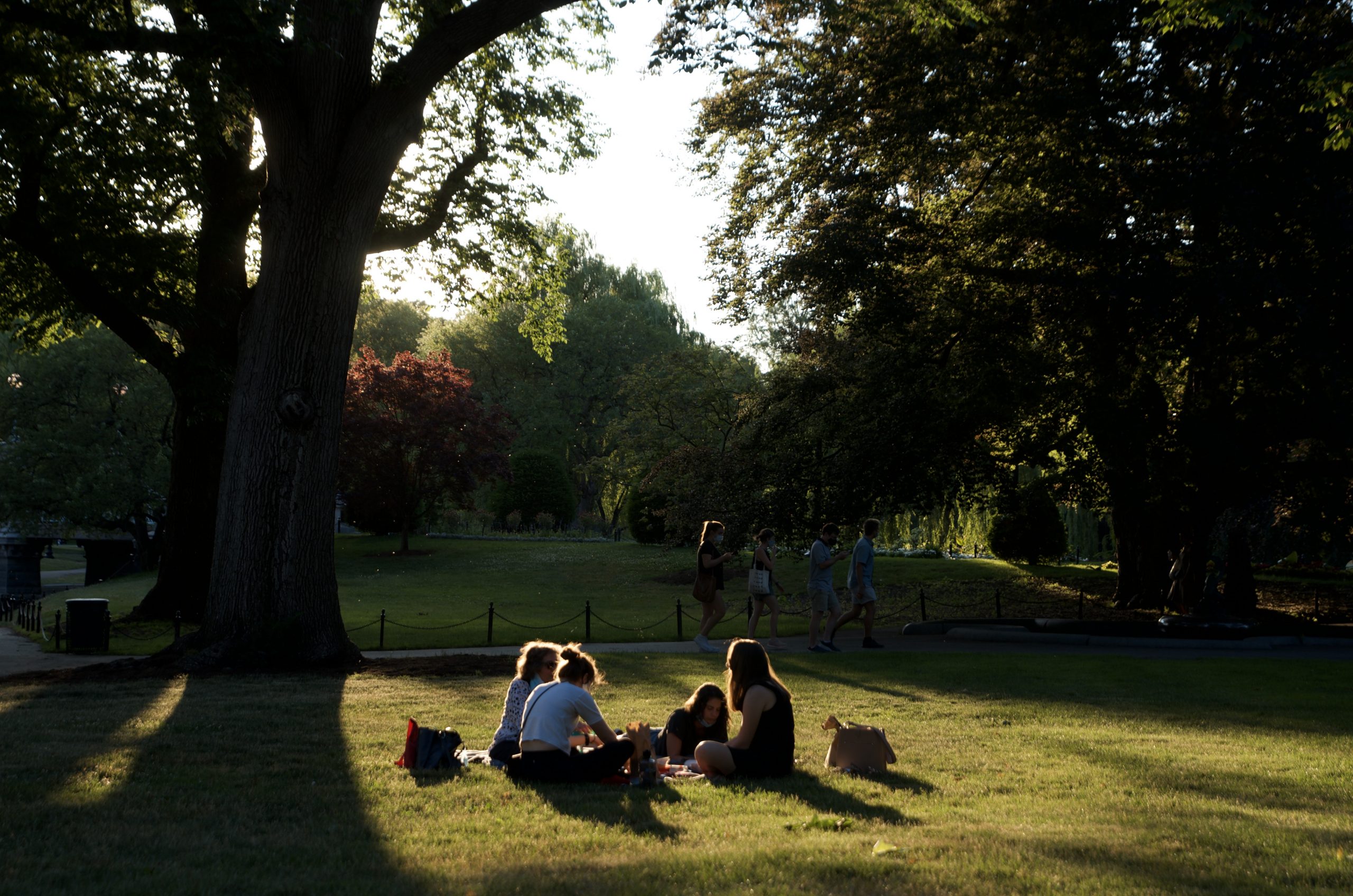
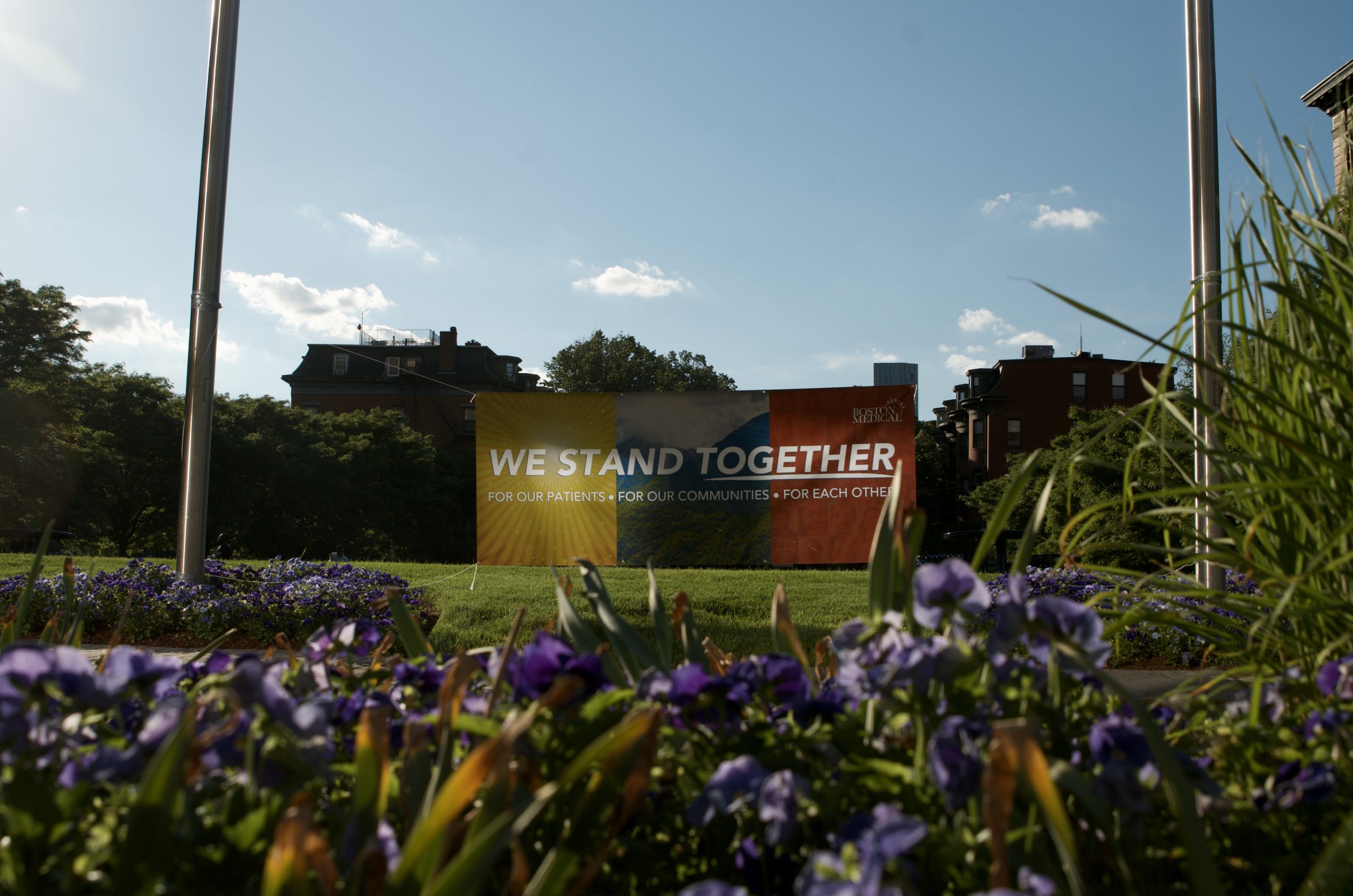
Douglas Darrah, CAS, English ’20